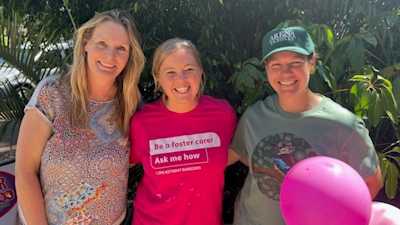As a respite foster carer, you will provide a caring and supportive role, not only to children in need, but also to their full-time foster family.

Image: Foster carers Sherryn and Veijo stand together in their kitchen.
What is Respite Care?
Respite care gives full-time foster carers a short break. Although you may only dedicate a small amount of time per month as a respite foster carer, you will be making an enormous impact by offering stability and care to some of Australia’s young people and children a who cannot live safely at home.
Respite carers usually have the children one or two weekends a month or for other short periods of time such as during the school holidays. Respite care is usually planned and scheduled well in advance but can sometimes be required at short notice.
The length of care can vary from a day or a weekend to a short break over school holidays.
“My respite commitment is one weekend every six weeks,” says one of our carers.
“The five weeks in between I still do lots of other things. I don’t see that respite care ever holds me back – if anything it enhances my life.”
Respite foster carers support children and teenagers by providing a safe space and supportive relationship, outside of the young person's full-time carer, in the same way extended family, such as aunts, grandparents and family friends, do.
Our foster and kinship carers say they still create strong connections, not only to the children in care, but also to their full-time foster carers and their own children.
“I’ve been made to feel like extended family and was invited to spend Christmas with them, which was really special for me," shared one carer.

Image: A family of four are standing outside their home smiling at the camera. There is a man, woman, girl and boy.
Sherryn and Veijo provide long term care and respite care with Life Without Barriers. They always knew that when life slowed down a little, they would open their home to children in foster care. Sherryn had grown up in a big family, and her mum was a foster carer, so she was used to having lots of children around.
"These children have a family and it’s important for them to remain connected and understand where they’re from... we strongly believe and support this," Sherryn said.
Brodie and John are also carers with Life Without Barriers who provide long term and respite care. We asked them how they create a welcoming environment for children and young people when it may only be for a short time.
“You just have to welcome them into your home, your life, your routine like they have always been there and are not going to leave. You need to treat them like your own family, your own children,”
“There could be 1000 reasons as to why that child is coming to you for respite. Welcoming them into your home as part of the family is going to make them feel appreciated, wanted, loved, safe and secure.”
Breaking down barriers can often be achieved through fun games as well, Brodie shared.
“We love taking the kids and teens to bowling and putt-putt golf. We find these two activities give the kids a little friendly competition and helps them bond,” said Brodie.
What kind of support does Life Without Barriers provide respite carers?
We work hard to make sure you are never alone in your journey as a respite foster carer. We know that to be able to provide care and support to the children in your care, you need to feel supported and confident in your role. Our carers say they have benefited from the support services Life Without Barriers provides.
Foster and kinship carers receive ongoing support which includes ongoing training and access to support networks – like MOCKINGBIRD FAMILY™. Our foster carers are never alone in their caring journey. It can be difficult to comprehend the experiences children bring with them, so it is important that carers feel supported and confident in their role. This support is crucial in helping foster carers provide the best possible care for children and young people!
Training: we provide carers with a range of learning opportunities suited to their level of experience and the needs of children in their care.
24/7 carer support: our carers have access to support at any time of the day or night for advice, support and direction in stressful situations.
Financial support: carers receive a tax-free allowance to support the needs of children placed in their care.
Specialist support: our specialist staff work with children and alongside carers where additional support is needed.
Carer networking: talking to other carers is sometimes the best form of support. Through regular carer events, we create opportunities for carers to share their concerns, celebrate successes and provide feedback to the Life Without Barriers team.
It really is just about being willing to welcome a child or young person into your family and ensuring that you are committed to working with their team which includes their foster parents, their family, Life Without Barriers care team and the Government Department to work towards better outcomes for the child or young person.


